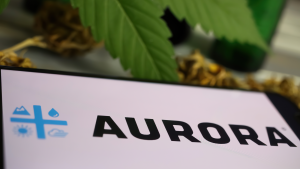This article covers six blue-chip stocks to sell now. These stocks are severely overvalued or are likely to move down soon due to the coming recession or a slump in demand.
The point is analysts’ forecasts are likely to be lower, which could push these stocks down further. The stocks on this list have little or no GAAP-based earnings and also do not produce free cash flow (FCF). The latter point is more important than the former.
Moreover, none of these stocks pay a dividend nor do they buy back shares. Both of these are ways that companies can return capital to shareholders, which provides value to the stocks. So without these traits, there is little holding these stocks from tumbling further when analysts finally reduce their forecasts.
Let’s dive in and look at the following stocks:
| Ticker | Company | Price |
| ACB | Aurora Cannabis Inc. | $1.43 |
| AFMD | Affirmed N.V. | $2.95 |
| AGS | PlayAGS, Inc. | $4.70 |
| CURI | CuriosityStream Inc. | $1.78 |
| EWTX | Edgewise Therapeutics, Inc. | $10.41 |
| GEVO | Gevo, Inc. | $2.53 |
Blue-Chip Stocks to Sell: Aurora Cannabis (ACB)

- Market Cap: $410 million
Aurora Cannabis (NASDAQ:ACB) is a cannabis and cannabis derivative products seller based in Canada. So far this year, the stock is down 76%. In the past year, it’s off over 81%. Things aren’t looking up for the company so far and investors might want to reconsider before they think it is due for a rebound.
One reason is that the company’s earnings have been deteriorating. For example, first quarter (Q1) revenue missed analysts’ expectations by 4.6%, or $1.77 million. The company also lost 17 cents per share on a normalized basis.
Moreover, analysts now forecast earnings for the year ending Jun. 30 will be negative $4.06 per share. This is after the company lost $987 million last year, or 56 cents per share.
In fact, the company has done nothing but lose money for the past six years on an operating basis. More of this can be expected going forward. So far, Aurora Cannabis has not been able to generate sufficient sales to get cash flow positive either on an EBITDA basis or on an operating cash flow basis.
This is not a great track record. Despite analysts’ projections of a turnaround for next year, I doubt that the company will be able to pull this off, given its track record.
Affirmed N.V. (AFMD)

- Market Cap: $434.5 million
Affirmed N.V. (NASDAQ:AFMD) is a clinical-stage biopharmaceutical company focused on fighting lymphoma. Based in Germany, it has applied for clinical stage approvals in the US, Germany, and the rest of Europe.
Its lead cancer drug candidate is AFM13 and it has completed a Phase II clinical study for peripheral T-cell lymphoma. It is also in other Phase II studies, Phase I studies, and pre-clinical studies for other forms of lymphoma.
The company is forecast to make $33.25 million in revenue this year and up to $39.17 million next year, according to Seeking Alpha. Unfortunately, however, it is still on track to lose 70 cents per share this year and 87 cents next year.
Moreover, its balance sheet shows that it has just $187.5 million in cash. That may be enough to make it through Phase III trials, but possibly not. The fact is the company may have to raise additional cash. This could load the balance sheet with debt, but more likely it will have to raise more equity capital. This may not be apparent until all its plans for further clinical studies are revealed.
Until then, investors may want to steer clear. This is one of the blue-chip stocks to sell.
Blue-Chip Stocks to Sell: PlayAGS (AGS)

- Market Cap: $170.7 million
PlayAGS (NYSE:AGS) is a gaming company that devises and patents various games used in slots and table games in Las Vegas, throughout the U.S., and overseas. It is somewhat ironic that this company that makes its revenue from gamblers cannot seem to make a profit this year. After all, the “house” is supposed to have an edge over the gambling public.
For example, analysts now forecast that PlayAGS will lose 36 cents per share this year. Moreover, at $4.61, it still trades for 15x next year’s forecast of 31 cents per share. That is very expensive especially since the company is likely to be hurt by a recession over the next several quarters.
To make matters worse, the company does not pay a dividend from which investors can have some stability, given the volatility in the gambling business. As a result, the stock is down around 34% year-to-date and off 43% in the past year. This makes it one of the blue-chip stocks to sell now if you already own it.
CuriosityStream Inc. (CURI)

- Market Cap: $92.36 million
CuriousityStream (NASDAQ:CURI) is a documentary streaming company that is forecast to lose money this year and next year, despite growing revenue expectations.
For example, analysts forecast that CuriosityStream will lose almost 99 cents for 2022, as well as 41 cents next year. This is despite the fact that the company is forecast to make $97 million in revenue this year and 38% more next year.
The problem is that CuriosityStream only charges $20 annually for its documentary streaming service, much less than other well-known streaming services. In fact, many of its competitors also lose money. Maybe more fundamental to the issue is that people simply won’t be willing to spend more than that for documentaries.
Somehow the company will have to figure out a more profitable business model. For example, last quarter the company lost $12.3 million in operating cash flow on sales of $17.6 million. That is a negative 70% operating cash flow margin.
With just $82.7 million in cash on its balance sheet, the company could run out of operating cash in less than two years. The stock price will decline well before then as it starts to reflect the need for another dilutive capital raise.
This is why this is one of the blue-chip stocks to sell now if you own it. If you don’t own it, avoid buying it until its business model improves.
Blue-Chip Stocks to Sell: Edgewise Therapeutics (EWTX)

- Market Cap: $503.7 million
Edgewise Therapeutics (NASDAQ:EWTX) is a biopharmaceutical company focused on dystrophinopathies, which leads to various forms of muscular dystrophy. So far, its solutions are in Phase I of clinical trials.
Moreover, the company has no revenue. It is forecast to lose $1.49 per share this year and $1.95 next year. Needless to say, it is burning through cash, including $13 million last quarter. That puts it at an annual burn rate of over $52 million annually.
Luckily, the company still has a good deal of cash, including $265.8 million as of the end of March. The company can burn through several years of cash at its present rate, although when it starts into Phase II and higher, the cash burn rate will increase dramatically.
Until Edgewise Therapeutics can figure out how to produce some revenue and reduce its cash burn, expect to see its stock price continue to be volatile. So far this year, the stock is down 38.5% and in the past year it is off almost 53%.
Blue-Chip Stocks to Sell: Gevo, Inc. (GEVO)

- Market Cap: $547.9 million
Gevo, Inc. (NASDAQ:GEVO) is a biofuels company with growing revenue. However, they unfortunately are growing negative income, as well. For example, this year the company is forecast to produce $5.51 million in revenue and it would grow to $11.8 million by next year.
But the problem is the company will lose 33 cents per share this year and 29 cents per share next year. So, even with the dramatic rise in revenue, Gevo will still lose money.
Moreover, it is burning through a good deal of cash. Last year its operating cash flow was negative $48.8 million and capex spending was an additional burn of $86.3 million. That works out to a total of $135.1 million in negative free cash flow. Last quarter alone it had a negative $43.7 million in cash burn between the two items.
The problem is the company has no revenue to speak of and its cash balance is only $310.4 million. That means it could end up burning through this cash in less than two years at this cash burn rate.
And that means that the stock will fall significantly from here before then. Investors should probably stay away from the company for now, at least until it can reduce its cash burn.
On the date of publication, Mark Hake did not hold (either directly or indirectly) any positions in the securities mentioned in this article. The opinions expressed in this article are those of the writer, subject to the InvestorPlace.com Publishing Guidelines.
